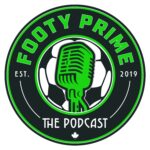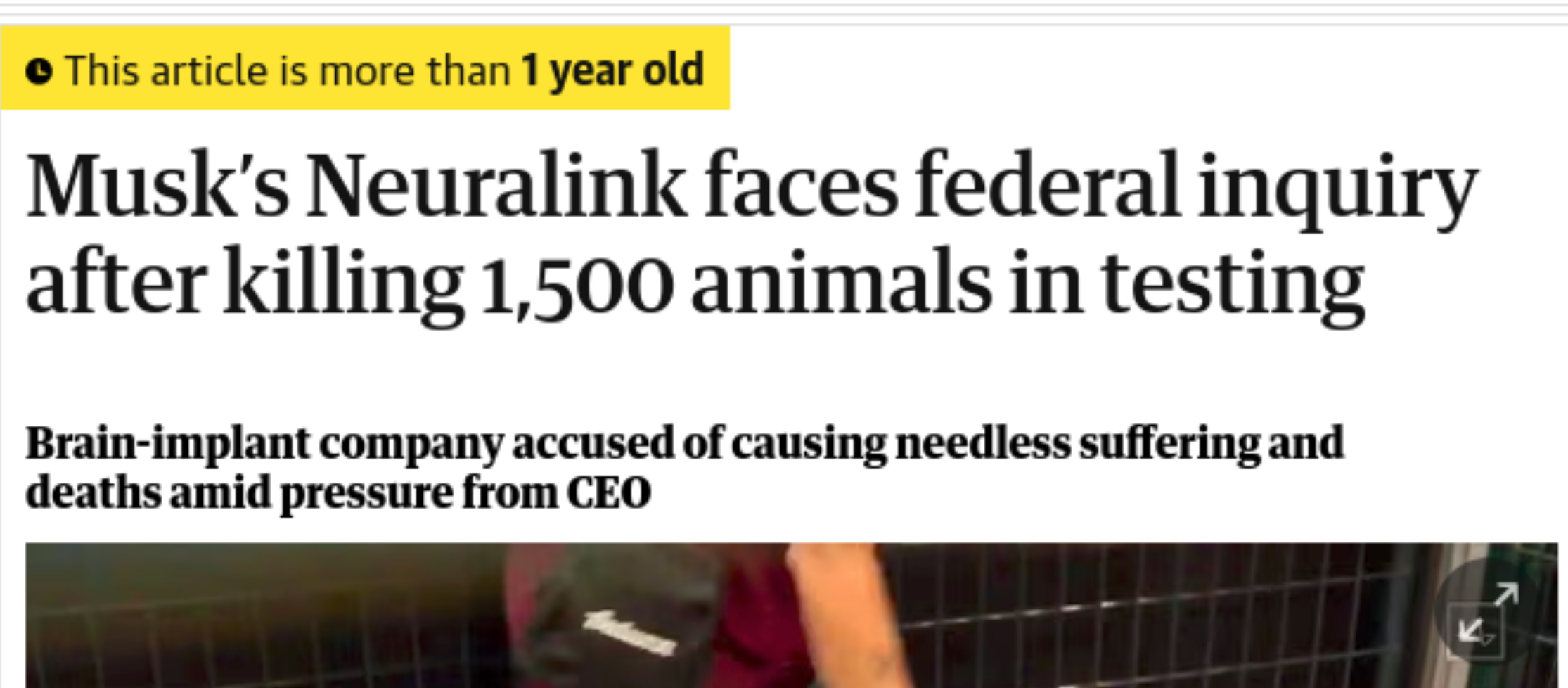
Elon Musk Put’s Neuralink Chip Into A Human Brain Less Than A Year After It Killed A Pong Playing Monkey – This Should End Well…
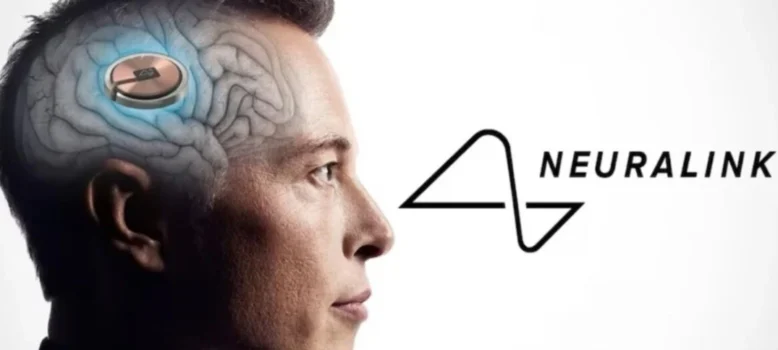
Huzzahhh!!!
Less than a year after admitting a monkey died trying to play Pong through his “Neuralink” brain chip, Elon says his first human test subject is “recovering” after being Elon’s first human Guinea Pig.
CNN: Elon Musk’s controversial startup Neuralink has implanted a chip in a human brain for the first time, the billionaire said in a post on his X platform late Monday.
The operation took place on Sunday and the patient was recovering well, he added.
Musk’s announcement could mark an important milestone for Neuralink’s efforts to usher potentially life-transforming technology out of the lab and into the real world. But he offered few details, and it’s unclear from Musk’s post how significant of a scientific advancement the implantation represents.
The company had received approval to study the safety and functionality of its chip implant and surgical tools.
“Initial results show promising neuron spike detection,” the world’s richest man and Neuralink founder said on X, the social media platform he owns.
Neuralink’s first product would be called Telepathy, he said in another post, adding that its initial users will be people who have lost the use of their limbs.
“Imagine if Stephen Hawking could communicate faster than a speed typist or auctioneer. That is the goal,” he wrote.
Neuralink has been working toward using implants to connect the human brain to a computer for half a decade, but the company faced scrutiny after a monkey died in 2022 during an attempt to get the animal to play Pong, one of the first video games. In December 2022, employees told Reuters that the company was rushing to market, resulting in careless animal deaths and a federal investigation.
In May last year, Neuralink received FDA clearance for human clinical trials, and a few months later, the startup began recruiting patients with quadriplegia caused by cervical spinal cord injury or amyotrophic lateral sclerosis (ALS).
The trial is part of what Neuralink is calling its “PRIME Study,” short for “Precise Robotically Implanted Brain-Computer Interface,” which aims to study the safety of its implant and surgical robot, and to test the functionality of its device, the company said in a September blog post about recruiting trial participants.
Trial patients will have a chip surgically placed in the part of the brain that controls the intention to move. The chip, installed by a robot, will then record and send brain signals to an app, with the initial goal being “to grant people the ability to control a computer cursor or keyboard using their thoughts alone,” the company wrote in September.
Cool, cool. Every animal who’d ever had a chip implanted died a horrible fucking death (as recently as last year), and now Elon is onto human trials. It’s the entire plot from Netflix’s “Badlands Hunter,” which takes place in a post-apocalyptic world where superhumans die terrible deaths thanks to “rushed science.” I’d say not having any visible proof the animal implants worked in the face of multiple horrific accounts of their deaths qualify as ‘rushed,’ but I’m no scientist. Maybe Neuralink is like Elon’s self-driving car thing and the everything app “X”: a pipe dream of lies based on limited functionality. Maybe Neuralink is a legit game changer for amputees and quadriplegics.
After learning about the monkey trials, I wouldn’t be lining up for human trials if I were you, though…
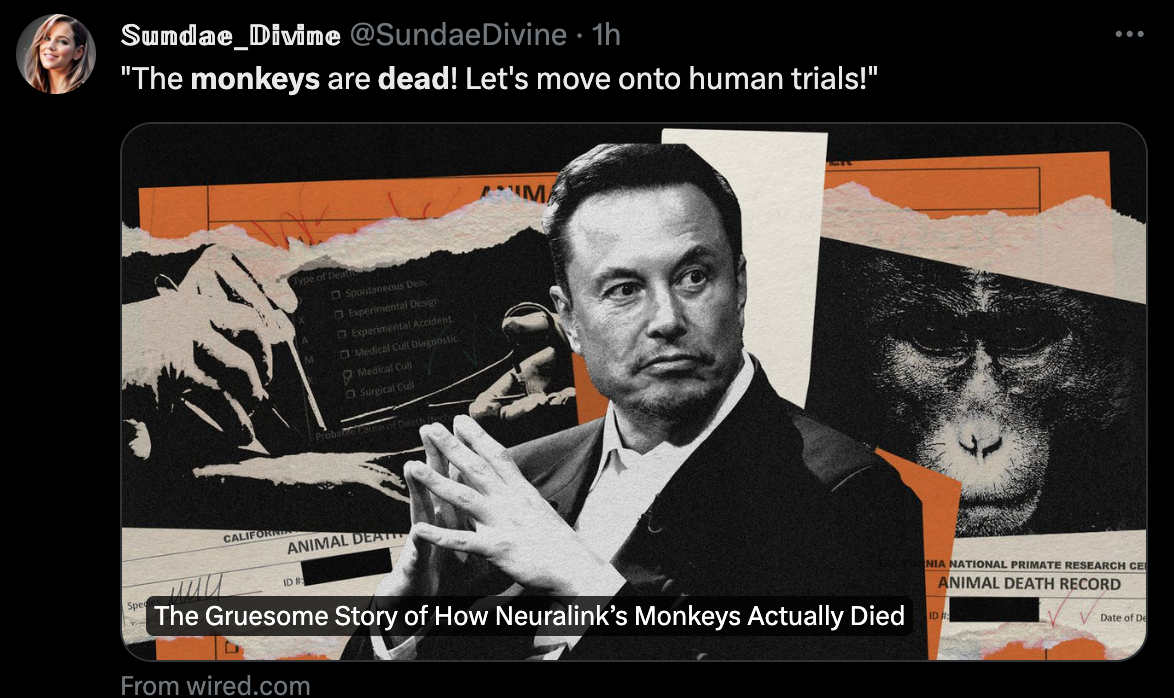
Wired: UC Davis veterinary records cited by the Physicians Committee—which WIRED also obtained through a subsequent California public records request—chronicle a battery of complications that developed following procedures involving electrodes being surgically implanted into monkeys’ brains. The complications include bloody diarrhea, partial paralysis, and cerebral edema, a condition colloquially known as “brain swelling.”
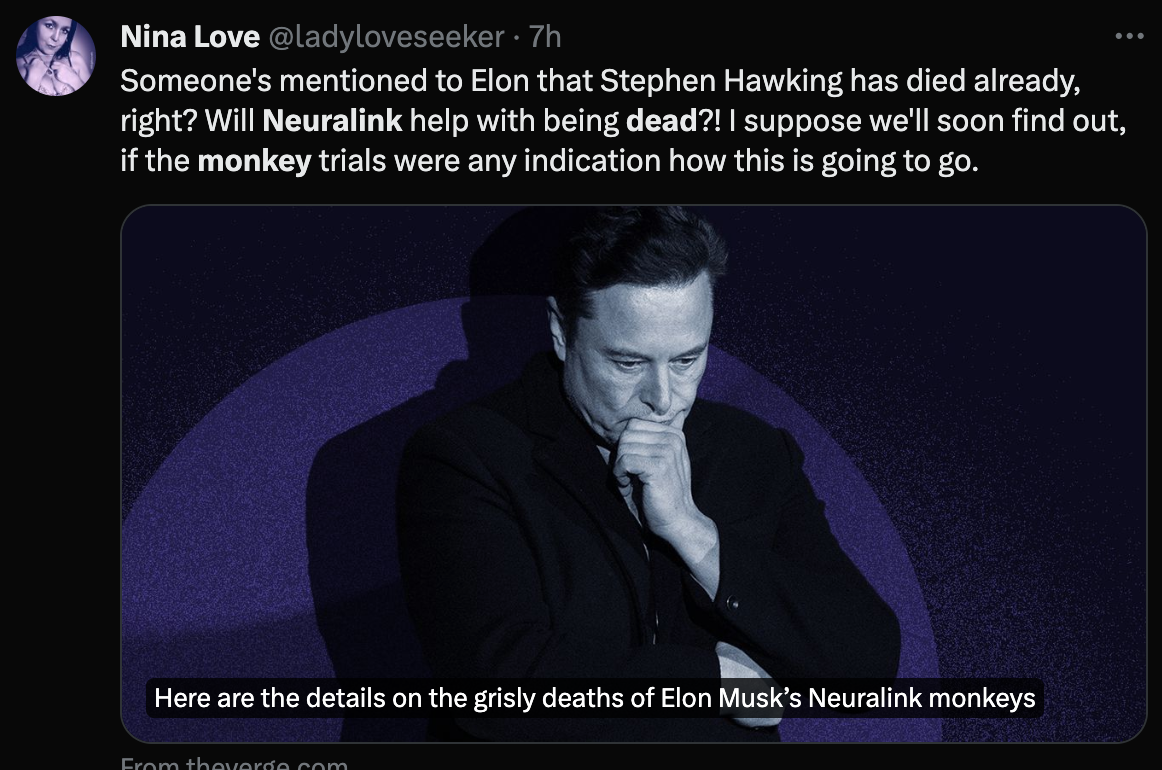
Additional veterinary reports show the condition of a female monkey called “Animal 15” during the months leading up to her death in March 2019. Days after her implant surgery, she began to press her head against the floor for no apparent reason; a symptom of pain or infection, the records say. Staff observed that though she was uncomfortable, picking and pulling at her implant until it bled, she would often lie at the foot of her cage and spend time holding hands with her roommate.
Animal 15 began to lose coordination, and staff observed that she would shake uncontrollably when she saw lab workers. Her condition deteriorated for months until the staff finally euthanized her. A necropsy report indicates that she had bleeding in her brain and that the Neuralink implants left parts of her cerebral cortex “focally tattered.”
Yet another monkey, Animal 22, was euthanized in March 2020 after his cranial implant became loose. A necropsy report revealed that two of the screws securing the implant to the skull loosened to the extent that they “could easily be lifted out.” The necropsy for Animal 22 clearly states that “the failure of this implant can be considered purely mechanical and not exacerbated by infection.” If true, this would appear to directly contradict Musk’s statement that no monkeys died as a result of Neuralink’s chips.
Shown a copy of Musk’s remarks on X about Neuralink’s animal subjects being “close to death already,” a former Neuralink employee alleges to WIRED that the claim is “ridiculous,” if not a “straight fabrication.” “We had these monkeys for a year or so before any surgery was performed,” they say. The ex-employee, who requested anonymity for fear of retaliation, says that up to a year’s worth of behavioral training was necessary for the program, a time frame that would exempt subjects already close to death.
They say you should never buy a new model-year vehicle. That goes double for me when it comes to being the first group of humans to microchip their brains after 1500 dead monkeys tapped out.
If, and I mean IF, Neuralink works, it will revolutionize how people with disabilities access their world. I’d LOVE to have faith in Elon’s Nuralink chip, but I doubt the surgery even happened. It’s a judgment call based on past precedent of every time he lied about his groundbreaking genius, which you can read all about here:
“The fundamental laws of physics don’t care about this bullshit”
Via @doctorow
There’s a whole website documenting Elon Musks lies.https://t.co/GV0OWfh0wk— ArneKuilman (@ArneKuilman) July 28, 2023
Dude is a firehose of predictions that still haven’t come true. In some cases, those predictions are ten years old.
But he’s a sales guy at heart (all sales guys lie), and this sales pitch made me laugh.
4 years ago, he was telling possible candidates to sign up to be test subjects via the incredible “you’ll make way more money with a brain chip than without one, so you can take over humanity” sales pitch, which I didn’t think was the point.
Dean Blundell
Dean Blundell is a Canadian radio personality. Best known as a longtime morning host on CFNY-FM (The Edge) in Toronto, Ontario. In 2015 he was named the new morning host on sports radio station CJCL (Sportsnet 590 The Fan). Dean started his career in radio in 2001 and for nearly 20 years been entertaining the radio audience. Dean’s newest venture is the launch of his site and podcast which is gaining tremendous momentum across North America.






